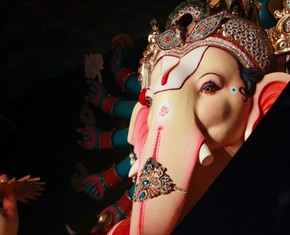The views expressed in our content reflect individual perspectives and do not represent the authoritative views of the Baha'i Faith.
Part III – A New Spiritual-But-Not-Religious Religion
And more letters to God from children:
Dear God, Please send me a pony. I never asked for anything before. You can look it up. – Bruce
Dear God, I think about you sometimes, even when I’m not praying. – Elliott
Dear God, I do not think anybody could be a better God. Well, I just want you to know that I am not just saying this because you are God already. – Charles
Dear God, I didn’t think orange went with purple until I saw the sunset you made on Tuesday. That was cool! – Eugene
The phrase “spiritual but not religious” has become a cliché, but it describes a deeply serious concern – that adopting and practicing a religion actually risks making you less spiritual.
Multiple surveys have shown that a significant portion of Americans – somewhere between one-tenth to almost a third of the adult population – describe themselves as spiritual but not religious (SBNR). In one survey, 72% of young, Generation Y Americans identified as SBNRs. This growing group, known as the unchurched or just as spiritual seekers, generally believes in a Creator but views God differently than the fundamentalist religious factions. They tend to think of the old forms of religion as bound by dogma, doctrine and ritual, instead of encouraging the deep feelings, powerful insights and connection with the mystical that our minds, hearts and souls yearn to make.
The Baha’i teachings powerfully support this contemporary view, saying that the core of religious faith is the mystic feeling that unites man with God – simply renewed to address the needs of each age in which it exists. All religions, Baha’is believe, is a single system of progressively-revealed faiths, and the Prophets and Messengers who established those faiths teach the same essential truths. That one mystic faith, the Baha’is believe, is renewed throughout history:
In the beginning the tree was in all its beauty, and full of blossoms and fruits, but at last it became old and entirely fruitless, and it withered and decayed. This is why the True Gardener plants again an incomparable young tree of the same kind and species, which grows and develops day by day, and spreads a wide shadow in the divine garden, and yields admirable fruit. So it is with religions; through the passing of time they change from their original foundation, the truth of the Religion of God entirely departs, and the spirit of it does not stay; heresies appear, and it becomes a body without a soul. That is why it is renewed. – Abdu’l-Baha, Some Answered Questions
A modern belief system that emphasizes unity, fellowship and harmonious interaction with everyone, the Baha’i Faith teaches the deep spiritual inter-connectedness of humanity and the essential oneness of all religions. Baha’is believe that the teachings of Baha’u’llah, the founder of the Baha’i Faith, comprise that modern renewal of religion.
If you think of yourself as spiritual more than religious, you may want to investigate the Baha’i Faith and its teachings further. Increasingly, spiritually-minded people are becoming Baha’is and taking part in the warm, diverse community life the Baha’is are building. Baha’is don’t proselytize or force their beliefs on others, and there is no Baha’i clergy, which means you can conduct your own independent investigation, and come to your own conclusions. The Baha’i teachings and writings are universally available online, in print and in just about every language. They offer an expansive, joyful and beautifully spiritual path to a unified global community and a profoundly positive, progressive message of love, unity and peace.
You May Also Like
Comments

















However, I'd be very careful to say that the Baha'i Faith is an SBNR religion. Baha'u'llah made it very clear that one's religious life, spiritual life, and mystical life must all be balanced. When we read the last of the Seven Valleys, i.e. The Valley of True Poverty and Absolute Nothingness, Baha'u'llah says: 'In all these journeys the traveler must stray not the breadth of a hair from the “Law,” for this is indeed the secret of the “Path” and the fruit of the Tree of “Truth”; and in all these stages he must cling to the robe of obedience to the commandments, and hold fast to the cord of shunning all forbidden things, that he may be nourished from the cup of the Law and informed of the mysteries of Truth.' He said this in response to a Sufi shaykh. When we read the footnote of the above quoted passage, it says: "This refers to the three stages of Súfí life: 1. Sharí’at, or Religious Laws; 2. Taríqat, or the Path on which the mystic wayfarer journeys in search of the True One; this stage also includes anchoretism. 3. Haqíqat, or the Truth which, to the Súfí, is the goal of the journey through all three stages. Here Bahá’u’lláh teaches that, contrary to the belief of certain Súfís who in their search for the Truth consider themselves above all law, obedience to the Laws of Religion is essential."